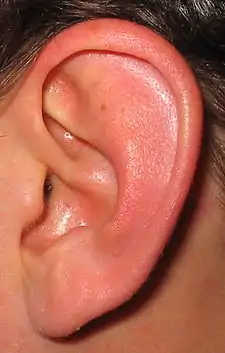कान
Hindi

कान
Etymology
Inherited from Sauraseni Prakrit 𑀓𑀡𑁆𑀡 (kaṇṇa), from Sanskrit कर्ण (karṇa, “ear”). Doublet of कर्ण (karṇ); a tatsama.
Pronunciation
- (Delhi Hindi) IPA(key): /kɑːn/, [kä̃ːn̪]
Audio (file)
Noun
कान • (kān) m (Urdu spelling کان)
Declension
Declension of कान (masc cons-stem)
| singular | plural | |
|---|---|---|
| direct | कान kān |
कान kān |
| oblique | कान kān |
कानों kānõ |
| vocative | कान kān |
कानो kāno |
References
- Bahri, Hardev (1989), “कान”, in Siksarthi Hindi-Angrejhi Sabdakosa [Learners' Hindi-English Dictionary], Delhi: Rajpal & Sons.
- Turner, Ralph Lilley (1969–1985), “kárṇa”, in A Comparative Dictionary of the Indo-Aryan Languages, London: Oxford University Press
Marathi

कान
Pronunciation
- IPA(key): /kan/
Etymology 1
Inherited from Old Marathi 𑘎𑘰𑘡 (kāna), from Maharastri Prakrit 𑀓𑀡𑁆𑀡 (kaṇṇa), from Sanskrit कर्ण (karṇa).
Declension
| Declension of कान (kān) | |||
|---|---|---|---|
| direct singular |
कान kān | ||
| direct plural |
कान kān | ||
| singular | plural | ||
| nominative | कान kān |
कान kān | |
| oblique | काना- kānā- |
कानां- kānāN- | |
| dative | कानाला kānālā |
कानांना kānāNnā | |
| ergative | कानाने kānāne |
कानांनी kānāNni | |
| instrumental | कानाशी kānāśi |
कानांशी kānāNśi | |
| locative | कानात kānāt |
कानांत kānāNt | |
| vocative | काना kānā |
कानांनो kānāNno | |
| Oblique Note: The oblique case precedes all postpositions. There is no space between the stem and the postposition. Dative Note: -स (-sa) is archaic. -ते (-te) is limited to literary usage. Locative Note: -त (-ta) is a postposition. | |||
| Genitive declension of कान | ||||||||
|---|---|---|---|---|---|---|---|---|
| masculine object | feminine object | neuter object | oblique | |||||
| singular | plural | singular | plural | singular* | plural | |||
| singular subject | कानाचा kānāċā |
कानाचे kānāce |
कानाची kānāci |
कानाच्या kānāca |
कानाचे, कानाचं kānāce, kānāċa |
कानाची kānāci |
कानाच्या kānāca | |
| plural subject | कानांचा kānāNċā |
कानांचे kānāNce |
कानांची kānāNci |
कानांच्या kānāNca |
कानांचे, कानांचं kānāNce, kānāNċa |
कानांची kānāNci |
कानांच्या kānāNca | |
| * Note: Word-final ए (e) in neuter words is alternatively written with the anusvara and pronounced as अ (a). Oblique Note: For most postpostions, the oblique genitive can be optionally inserted between the stem and the postposition. | ||||||||
References
- Berntsen, Maxine, “कान”, in A Basic Marathi-English Dictionary, New Delhi: American Institute of Indian Studies, 1982-1983.
- Molesworth, James Thomas (1857), “कान”, in A dictionary, Marathi and English, Bombay: Printed for government at the Bombay Education Society's Press
- Date, Yasavanta Ramakrshna (1932-1950), “कान”, in Maharashtra Sabdakosa (in Marathi), Pune: Maharashtra Kosamandala.
- Turner, Ralph Lilley (1969–1985), “kárṇa”, in A Comparative Dictionary of the Indo-Aryan Languages, London: Oxford University Press
Nihali
Old Gujarati
Etymology
From Sauraseni Prakrit 𑀓𑀡𑁆𑀡 (kaṇṇa), from Sanskrit कर्ण (karṇa). Cognate with Old Marathi 𑘎𑘰𑘡 (kāna).
This article is issued from Wiktionary. The text is licensed under Creative Commons - Attribution - Sharealike. Additional terms may apply for the media files.